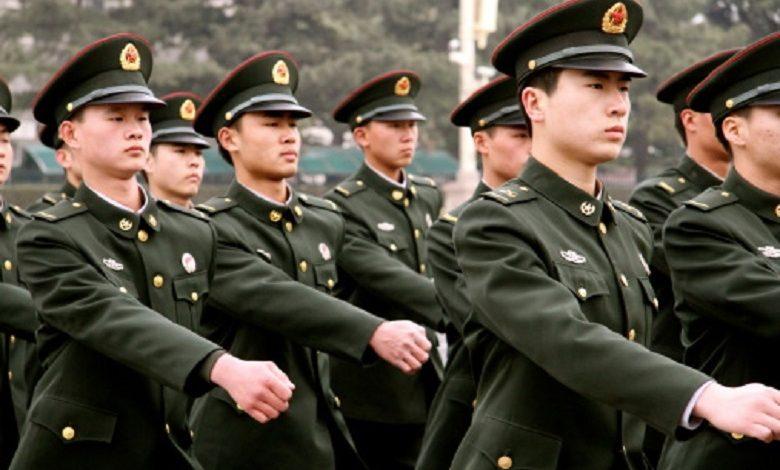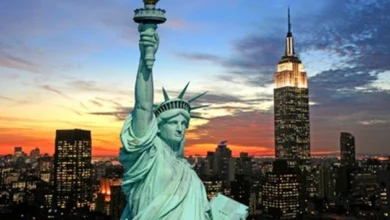First time in 31 years: What does the agreement between US, EU and UK mean to sanction China

Behind the major Western powers’ decision to punish Beijing for human rights violations against the Uighurs in Xinjiang, we can see the consolidation of an epochal change: from the cooperative relationship of the early years of the 21st century to a growing geopolitical confrontation.
The European Council held an emergency meeting on 26 June 1989 in Madrid to discuss what to do about China. Twenty-two days had passed since People’s Liberation Army tanks rolled into Tiananmen Square to crush the massive protest that had captured the world’s attention for almost two months.
The Chinese Red Cross reported that 2,700 people had been massacred, and pressure was mounting in the West for some kind of response. The European Union (EU) resolved to sanction China with an arms embargo to exert maximum pressure in a coordinated action with the US.
It took more than 31 years for a comparable initiative by the major Western powers against the Chinese government to be repeated. This week, Washington, Brussels, and London announced sanctions against senior officials in the Xinjiang region, who are believed to be responsible for serious human rights violations against the Uighur minority.
“China continues to commit genocide and crimes against humanity in Xinjiang,” said Antony Blinken, Joe Biden’s secretary of State, in reporting the measures. “Together with our allies around the world, we will continue to call for an immediate halt to China’s crimes.”
Dominic Raab, Britain’s foreign secretary, said what the People’s Republic was doing to the Uighurs represented “the largest mass detention of an ethnic and religious group since the Second World War”.
Beijing responded by seeking to make clear that it would not accept anyone conditioning its policies: it imposed sanctions against ten European citizens – including five MEPs, diplomats, and academics – and four agencies. It accuses them of “seriously harming Chinese sovereignty and interests and spreading pernicious lies and false information”.
The evidence of abuses against Uighurs in Xinjiang is immense. Confinements in labor camps, separation of parents and children, rape, and forced sterilization are some of the crimes committed in the government’s effort to eliminate any form of dissent and alternative identity.
But the EU and the United Kingdom’s decision to join the United States in pressing against China cannot be explained only by what is happening in Xinjiang. There is an unavoidable short-term factor, which is the change of government in Washington. Europe could hardly have coordinated such action with Donald Trump, who always appealed to unilateralism in his foreign policy.
There are also medium-term elements that cannot be ignored. This week’s decision is part of a general shift in focus from the West to China, which began a few years ago. Beijing ceased to be a convenient trading partner to become a threat to Western powers, who view its unstoppable economic advance and its increasingly adventurous foreign policy with concern.
The EU published in March 2019 a document entitled ‘EU-China: A Strategic Perspective’. This document affirms that the European bloc considers China a partner in different cooperation and negotiation areas and as a “systemic rival”.
Uighurs
The Xinjiang Autonomous Region, located in northwest China, is the largest of the administrative units that make up the country, although it is among the least populated. It has 25 million inhabitants, of which 13 million are Uighurs.
This ethnic group with Turkic roots has small communities spread over different countries in Asia, but the vast majority of its members live in Xinjiang. The cultural and identity contrasts between them and the Han, an ethnic group to which more than 90% of the Chinese belong, are enormous.
Religion is the most important differential feature. The revolution led by Mao Zedong, which gave rise to the People’s Republic in 1949, strongly fought the different creeds because it was interested in imposing only one: that of the Communist Party of China (CCP). So most of the Chinese are atheists, and the first minority is Buddhism.
The Uighurs, on the other hand, are predominantly Muslim, and for many of them, faith occupies a central place in life. That is why they have faced state repression for decades, one of the reasons different separatist groups have emerged. The most important is the Islamic Party of Turkestan, which has carried out various terrorist attacks in the region.
Fighting Islamic extremism is the main argument used by Beijing to justify ethnic cleansing in Xinjiang. But the truth is that the resurgence of the persecution coincided with the turn that the CCP began to take from 2012 when Xi Jinping assumed leadership.
At all levels of political, social, and economic life, there is a trend towards the centralization of power and the reduction of spaces for freedom and autonomy. In this context, the Uyghurs began to be seen as an anomaly that had to be corrected.
The mass incarcerations, evidence of systematic sexual abuse in some centers, and the involuntary dispersal of those who are released, through work assignments far from their families and communities, these crackdown in Xinjiang appear to be considerably worse than that in Tibet, which would have been one of the most likely triggers for sanctions at different times in the past 30 years. And Xinjiang is integrated into several global supply chains, such as cotton. This reinforces some in the West’s feeling that if they do not draw some kind of line, they will be complicit in what is happening.
Weeks ago, the group of world experts on human rights, war crimes, and international law of the Newlines Institute for Strategy and Policy published a detailed report in which it accuses China of committing a “genocide against the Uyghurs”.
The investigation points out that the campaign began in 2014 on Xi’s orders: High-ranking Chinese officials carried out orders to ‘detain all who should be detained, ‘clean them completely’, ‘destroy them from root to branch.’ and’ break their lineage, roots, connections, and origins’.
More than a million Uyghurs have been interned in a network of detention centers in Xinjiang. There they are subjected to the worst abuses and intense indoctrination, which seeks to erase the traits of their cultural origins, in addition to being forced to work.
There is also evidence that the government is separating thousands of children from their parents in an attempt to erase their identity. Adrian Zenz, a researcher at the Foundation for the Monument to the Victims of Communism in China, accessed official spreadsheets that show that between 2017 and 2019, the number of children who, as they have their parents locked up in centers of detention, are placed in internships under the guardianship of the State.
In recent years, concern has grown in the EU about the deterioration of human rights in China, as seen in the treatment of ethnic minorities.
What to expect
Europe and the United States’ sanctions will not have direct or immediate effects on the Uighurs’ situation. Nor are they going to force China to change its foreign policy.
Its scope is itself limited. They only aim to restrict the movements of four top officials: Zhu Hailun, former secretary of the Xinjiang Political Affairs Committee, considered the architect of the Uyghur detention program; Wang Junzheng, head of the Xinjiang Production and Construction Corps; Chen Mingguo, director of the Xinjiang Public Security Bureau; and Wang Mingshan, secretary of the Political Committee of the Xinjiang Autonomous Region.
Western powers know that these leaders were just the ones who carried out Xi and the CPC Central Committee’s orders. But they expressly avoided touching anyone in that circle so as not to trigger an escalation. The Chinese response was also measured since it sanctioned MEPs but no European authority.
What is relevant about the sanctions is that they end up shaping a break in the link between the West and China, which can have significant long-term effects. Of course, a total break is impossible. The economies of China, the United States, and Europe are fully integrated into global production and marketing chains that cannot be undone, but there may be an escalating confrontation.
China was no longer seen as a friendly partner and was considered a geopolitical rival. It is a logical consequence of two transformations that occurred in the last decades. On the one hand, the advance of the Chinese economy at a level that threatens many industrialized countries, which see their large companies lose market shares to the Chinese.
On the other hand, the turn in Chinese foreign policy, which in the last five years put aside the prudence that had characterized it for a long time and adopted a much more aggressive stance. The subjugation of Hong Kong’s autonomy, the naval deployment in the South Sea, and the deepening of the new silk road are just a few examples.
Western governments consider that competition is unequal, since being an authoritarian regime, China hardly has to be held accountable for its actions. For any democratic government, the initial handling of the coronavirus outbreak could have been devastating. Not so for the Chinese.
With Xi, the CCP has strengthened the state-led economic development model, carried out an ambitious technological innovation policy, and abolished the ‘low profile’ on the world stage.
Deep down, an approach towards China can be identified as a reaction to its behavior and the disillusionment that existed with the old paradigm of constructive engagement that marked the relations between the West and China until just a few years ago.
Behind the diplomatic pressure is the intention to make China pay a cost for violating human rights to settle the dispute. Although it is probably not enough for Beijing to change its attitude, it serves other countries to affect China’s image in the world. And the strength of soft power in international politics should not be underestimated. To the extent that China is seen as a hostile actor, its ability to influence will suffer.
It doesn’t seem like China is willing to go any other way. We have seen a qualitative change in the way it interacts with the world, especially with those countries that criticize it for its internal policies on matters such as human rights and COVID-19. Beijing knows that its behavior is risky and is creating big problems in its relations with key countries.
Around the world, public opinion towards China is becoming less favorable. But Chinese leaders don’t seem to care. As they have become a great power, they are determined to follow their domestic and foreign policies as they see fit, regardless of what other capitals think.




